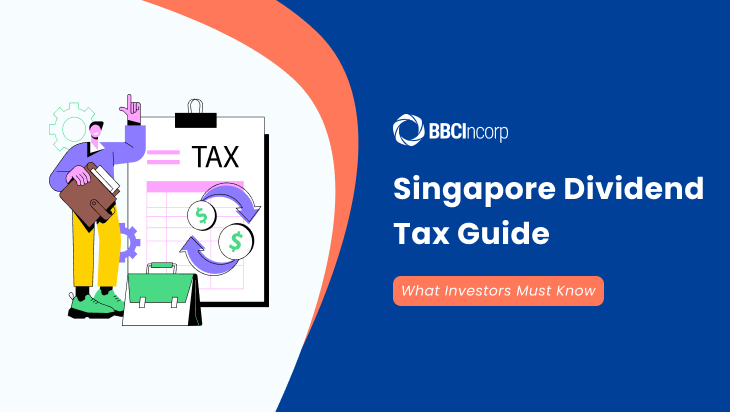
Singapore’s reputation as a low-tax jurisdiction makes it a strategic hub for global investors and multinational companies. Yet one common question remains: is dividend taxable in Singapore? Understanding the nuances of the Singapore dividend tax system is crucial for shareholders, business owners, and foreign investors looking to structure their income efficiently.
Under the one-tier corporate tax framework, most dividends distributed by Singapore-resident companies are exempt from further taxation. However, this exemption does not always apply to foreign-sourced dividends or specific business arrangements. Knowing when and how dividend income tax in Singapore applies ensures that investors stay compliant while maximizing post-tax returns.
This guide provides a comprehensive overview of Singapore’s dividend taxation landscape, clarifying what is taxable, what is not, and how investors can plan their dividend structures for sustainable tax efficiency.
What is a Dividend in Singapore?
In Singapore, a dividend is the portion of company profits distributed to shareholders as a return on their investment. It represents a company’s way of sharing financial success and rewarding capital participation. Dividends may be paid in cash, shares, or other assets, depending on the firm’s financial standing.
Under Section 403 of the Companies Act 1967, companies may declare dividends only out of realized profits, not from capital. This rule ensures sustainable distribution and financial transparency, principles that underpin Singapore’s strong corporate governance framework
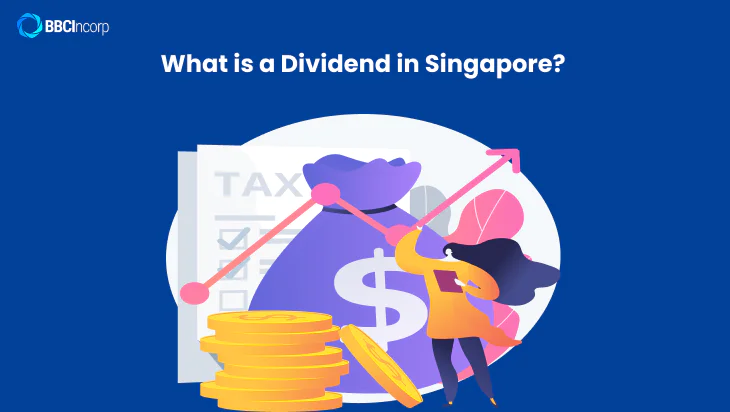
Interim Dividends
An interim dividend is declared before the end of a company’s financial year, usually based on interim results or management projections. It gives directors flexibility to reward shareholders earlier, particularly when short-term earnings are healthy. Because it does not require shareholder approval, an interim dividend can be declared quickly through a board resolution, a useful tool for companies aiming to maintain steady investor confidence throughout the year.
In practice, interim dividends are common among listed and well-capitalized firms. For example, a Singapore-listed conglomerate might declare quarterly or semi-annual dividends to reflect stable cash flow and strong interim profits. Such practices not only attract income-focused investors but also demonstrate the board’s proactive capital management.
However, flexibility must be balanced with prudence. Directors are legally obliged under Section 157 of the Companies Act 1967 to act honestly and ensure solvency before approving any interim payout. Paying excessive dividends without maintaining sufficient reserves may breach fiduciary duties. As such, interim dividends are both a signal of confidence and a test of management responsibility, an important prelude to how dividend income tax in Singapore may later apply.
Final Dividends
A final dividend is declared after the company’s audited financial statements are completed and approved at the Annual General Meeting (AGM). It represents the definitive profit distribution for the financial year and requires shareholder approval based on the board’s recommendation.
Final dividends carry greater weight in reflecting long-term performance and stability. Because they are based on verified financial data, they are generally larger and less volatile than interim payouts. For example, a holding company may distribute a final dividend after consolidating the results of its subsidiaries, a move often viewed by investors as a sign of maturity and sound financial discipline.
In Singapore’s context, final dividends also reinforce corporate transparency: they are publicly declared, recorded in AGM minutes, and communicated through official filings with ACRA. For shareholders, this provides assurance that the distribution aligns with compliance requirements and profit realities. Understanding this process is essential before examining whether such dividends, local or foreign-sourced, are taxable under the Singapore dividend tax framework administered by IRAS.
Are dividends taxable in Singapore?
Singapore’s tax regime is designed to avoid double taxation of corporate profits. To achieve this, the country operates under a one-tier corporate tax system, meaning that once a company has paid corporate tax on its chargeable income, dividends distributed from those taxed profits are not taxed again in the hands of shareholders. This framework makes Singapore highly attractive to investors and holding companies seeking tax-efficient structures.
According to the Inland Revenue Authority of Singapore (IRAS), most dividends paid by Singapore resident companies are not taxable in the hands of shareholders. However, there are exceptions depending on the source of the dividend (local or foreign) and the recipient’s tax residency. Understanding these nuances helps investors stay compliant and optimize tax outcomes.
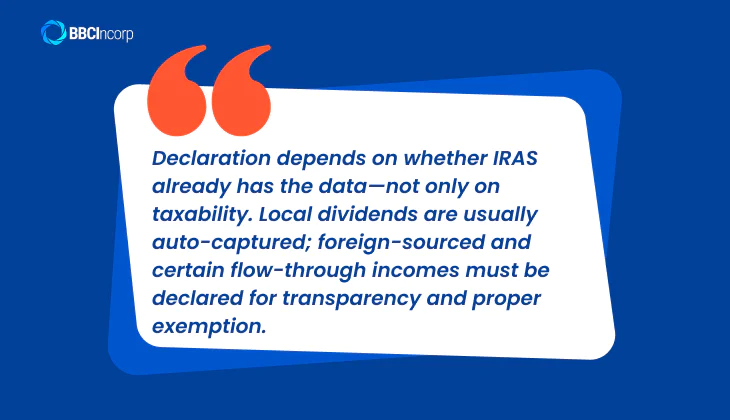
Understanding the basic tax rules for dividends
When investors ask “is dividend taxable in Singapore?”, the Inland Revenue Authority of Singapore provides a clear position: most dividends are not taxable. This rule originates from Singapore’s one-tier corporate tax system, under which a company’s profits are taxed once at the corporate level and are not taxed again when distributed to shareholders.
The One-Tier Corporate Tax System
Under this framework, dividends paid by Singapore-resident companies are exempt from further taxation because the underlying profits have already been subject to corporate income tax. Whether received by an individual or another company, these dividends are treated as non-taxable income, making Singapore a highly efficient jurisdiction for both local and international investors.
How It Differs from Other Jurisdictions
In contrast, countries like the United States or Australia operate on a two-tier tax model, where both corporate profits and shareholder dividends are taxed separately — often resulting in double taxation.
Singapore’s one-tier approach removes this overlap entirely, encouraging companies to reinvest profits or distribute dividends freely without additional tax burdens.
What Is Taxable and What Is Not
While most local dividends are exempt, IRAS taxes only specific cases such as:
- Foreign-sourced dividends received in Singapore that have not been taxed abroad.
- Income derived from co-operatives or other entities not covered under the one-tier framework.
Even so, such income may still qualify for exemption under Section 13(8) of the Income Tax Act 1947, provided it was taxed at a reasonable rate overseas and the Singapore recipient meets IRAS’s residency and benefit conditions.
Ultimately, the Singapore dividend tax structure ensures transparency and fairness, preventing double taxation while fostering sustainable, compliant growth for both businesses and investors.
Taxable vs. non-taxable dividend scenarios
Although Singapore’s tax regime largely exempts dividends from further taxation, certain cases still fall under taxable treatment. The Inland Revenue Authority of Singapore distinguishes between dividends based on their source of income and prior taxation status. Understanding these nuances helps clarify is dividends taxable in Singapore, and ensures businesses remain compliant with Singapore’s transparent tax framework.
Under the one-tier corporate tax system, dividends paid by Singapore-resident companies are non-taxable in the hands of shareholders. Once a company has paid corporate tax on its profits, those earnings can be distributed freely without additional dividend income tax Singapore liability. This single-tier model is one of Singapore’s key advantages compared to jurisdictions that impose double taxation on both corporate profits and shareholder income.
However, foreign-sourced dividends remitted into Singapore may still be taxable under certain conditions. According to Section 13(8) of the Income Tax Act 1947 and IRAS’s official guidance, these dividends can be exempt from tax if the following criteria are met:
- The foreign headline corporate tax rate in the source country is at least 15% at the time the income is received in Singapore;
- The recipient is a Singapore tax resident for the relevant year of assessment; and
- IRAS is satisfied that granting the exemption is beneficial to the taxpayer.
If any of these conditions are not fulfilled, the foreign-sourced dividend is considered part of the taxpayer’s chargeable income and will be subject to dividend income tax Singapore rules upon remittance.
Additionally, dividends distributed by co-operative societies are also taxable, as they are treated as regular income rather than exempt one-tier distributions.
For example, consider two shareholders. One receives dividends from a Singapore-resident company, these are non-taxable, as the profits have already been taxed domestically. The other receives dividends from a foreign subsidiary whose profits were not taxed abroad, these are taxable once brought into Singapore.
Hence, when investors ask “are dividends taxable in Singapore?”, the general answer remains NO, but exceptions apply. Taxability depends on whether the income has been previously taxed or qualifies for exemption under Singapore’s comprehensive tax regime.
Do I need to declare dividend income?
Singapore’s tax framework is known for its clarity and efficiency, yet many investors still ask a crucial question – “Do I need to declare dividend income?”.
While dividends distributed by Singapore-resident companies are exempt from further taxation under the one-tier corporate tax system, IRAS still requires proper reporting for transparency and compliance purposes. Knowing when declaration is necessary, and how to complete it correctly, helps taxpayers maintain good standing and avoid costly administrative issues.
In general, IRAS expects individuals and businesses to disclose any income that has not already been accounted for through its automated data collection systems.
This applies particularly to foreign-sourced dividends, trust or partnership distributions, and cross-border remittances, areas where Singapore’s tax authority may not automatically receive reporting information.
When declaration is required?
The obligation to declare dividends is not always tied to whether the income is taxable, but rather to whether IRAS has already captured the data. Dividends from Singapore-resident companies are typically excluded automatically from taxable income since the company distributing them has already paid corporate tax.
As a result, individuals or shareholders do not need to manually report these payments.
However, when the income originates from overseas sources and is remitted into Singapore, the situation differs. Even if such dividends may later qualify for tax exemption under Singapore’s foreign-sourced income rules, they must still be declared for record purposes. This ensures that IRAS can verify the source of the funds and apply any exemption correctly.
Income distributed through partnerships or trusts also falls within IRAS’s reporting scope. When a partnership receives dividends and allocates them to partners, or when a trust distributes earnings to beneficiaries, those recipients may need to declare their respective shares of dividend income.
Failure to do so could create inconsistencies during audit checks, as IRAS cross-references income data across entities.
Tax residency status further influences declaration requirements:
- Singapore tax residents must declare income that accrues in or is remitted into Singapore.
- Non-residents are only taxed on Singapore-sourced income, and local dividends are fully exempt.
In essence, declaration is not simply about tax liability, it is about ensuring completeness and traceability of income.
By proactively declaring reportable dividends, taxpayers reinforce transparency, comply with the Singapore dividend tax framework, and minimize audit risk.
How to report dividend income in Singapore?
Once it is established that dividend income must be declared, the next step is understanding how the reporting process works. In Singapore, IRAS has built a seamless digital framework to simplify compliance for both individuals and companies.
Reporting dividend income is not merely a formality; it is part of Singapore’s broader commitment to accurate record-keeping, tax transparency, and good governance. The IRAS myTax Portal serves as the primary platform for reporting and filing taxes.
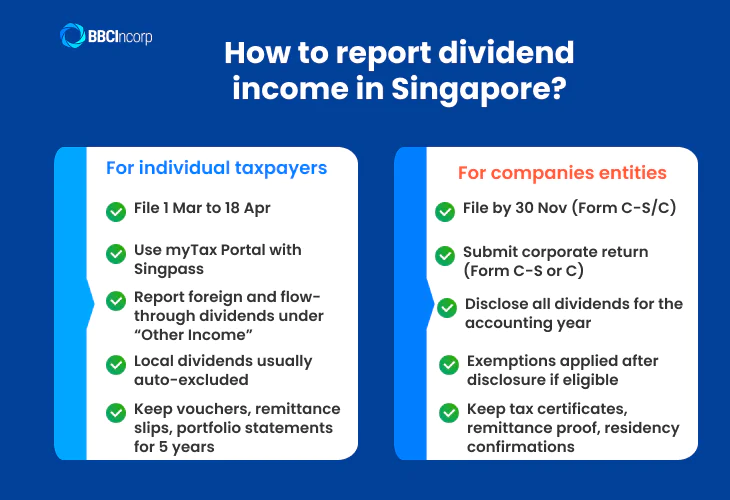
For individual taxpayers
The declaration is made during the annual personal tax filing period, typically from 1 March to 18 April. Using Singpass, taxpayers log in to the portal, review their pre-filled income data, and declare any reportable dividends under the “Other Income” section.
Dividends from Singapore-resident companies are automatically excluded under the one-tier corporate tax system, while foreign dividends or distributions received through trusts and partnerships must be entered manually if not pre-listed. Supporting evidence, such as dividend vouchers, bank remittance slips, or portfolio statements, should be retained for at least five years for verification.
For companies and business entities
Dividend reporting is completed through Form C-S or Form C, due by 30 November each year. Companies must disclose all dividends received during the accounting year, even if the amounts may later qualify for exemption under IRAS’s foreign-sourced income regime. Proper documentation, including tax certificates, proof of remittance, and tax-residency confirmations, should be maintained to support any claim for exemption.
Ultimately, learning how to declare dividend income in Singapore is about maintaining transparent records and fulfilling compliance duties efficiently. Leveraging IRAS’s digital infrastructure allows taxpayers to uphold integrity while meeting their obligations under the dividend income tax Singapore system.
Tax implications for different investor types
Singapore’s dividend tax framework delivers simplicity, stability, and fairness across all investor categories, yet its real impact varies depending on who receives the income. The Inland Revenue Authority of Singapore applies different tax treatments for individuals, corporations, and foreign investors, ensuring each group aligns with the country’s one-tier tax system while maintaining transparency.
Understanding these distinctions is key for businesses and investors seeking tax-efficient structures. By recognizing how dividends are treated for each investor type, one can minimize exposure to unnecessary taxation, improve cash management, and plan investments more strategically under Singapore’s dividend income tax framework.
Tax treatment for individuals
Individual investors in Singapore benefit from a highly efficient and investor-friendly tax regime. Under the one-tier corporate tax system, companies pay corporate income tax at 17% on their chargeable profits before distributing dividends, meaning shareholders are not taxed again when receiving those dividends. This policy effectively removes double taxation and promotes reinvestment of post-tax profits into the local economy.
However, the story changes when dealing with foreign-sourced dividends. If such dividends are remitted into Singapore, they may be taxable unless they qualify for IRAS’s foreign-sourced income exemption. The exemption generally applies when the income has been taxed in the foreign jurisdiction and the remittance benefits Singapore’s economy.
Residency plays a key role. Singapore tax residents, those residing or working in the country for at least 183 days per year, are taxed on income earned in or brought into Singapore. Non-residents are taxed only on Singapore-sourced income, and local dividends remain fully exempt.
In practice, this framework simplifies personal income tax Singapore obligations and minimizes administrative work for individuals. Investors can manage their portfolios confidently, knowing their local dividend income is protected from double taxation while foreign dividends are governed by clear, predictable rules.
Tax rules for companies and corporate shareholders
For corporate shareholders, Singapore’s tax treatment reflects its role as a regional business and investment hub. The Singapore dividend tax regime follows a single-tier model: profits are taxed once at the company level, and any subsequent dividend distributions are tax-free in the hands of shareholders.
This benefits holding companies, regional headquarters, and investment groups with multiple subsidiaries. Dividends distributed between Singapore-resident entities are fully exempt, preventing cascading tax layers and improving liquidity within corporate structures. It also promotes intra-group reinvestment and strengthens Singapore’s competitiveness as a hub for multinational group coordination.
When a Singapore company receives dividends from foreign subsidiaries, the treatment depends on whether the income was already taxed abroad and whether IRAS’s exemption criteria are met. If so, the dividend can be remitted tax-free; otherwise, it may be taxed upon receipt. To claim exemption, companies must maintain proof of foreign tax paid, remittance documentation, and the commercial purpose of the funds.
Beyond that, Singapore’s group relief and foreign tax credit schemes further enhance tax efficiency. They allow businesses to offset group-wide losses or foreign tax against Singapore tax liabilities, reducing duplication and improving cash flow flexibility. Through this transparent and practical approach, Singapore reinforces its reputation as a leading jurisdiction for corporate planning under the dividend income tax Singapore framework.
Foreign investors and international tax considerations
Foreign investors benefit from Singapore’s consistent commitment to open capital flow and tax certainty. Dividends distributed by Singapore-resident companies are not subject to withholding tax, regardless of where the shareholder resides. This no-withholding-tax policy ensures that investors receive dividends in full, supporting Singapore’s position as a global gateway for investment.
Singapore’s extensive network of over 90 Double Taxation Agreements (DTAs) further enhances protection for foreign investors. These treaties clarify taxing rights between jurisdictions and often provide for reduced or zero rates on cross-border dividend payments. Together, these mechanisms ensure that profits can be repatriated smoothly and without double taxation, a key consideration for multinational investors.
While Singapore does not tax outbound dividends, investors may still face obligations under their home-country tax laws. To ensure compliance with international standards such as CRS (Common Reporting Standard) and BEPS (Base Erosion and Profit Shifting), investors should maintain detailed documentation, including dividend vouchers, proof of remittance, and tax residency certificates.
Ultimately, Singapore’s blend of no withholding tax, treaty protection, and transparent administration makes it one of the most reliable jurisdictions for global investors. It offers a combination of certainty, simplicity, and compliance that continues to strengthen Singapore’s reputation as Asia’s most trusted hub for capital and cross-border wealth management.
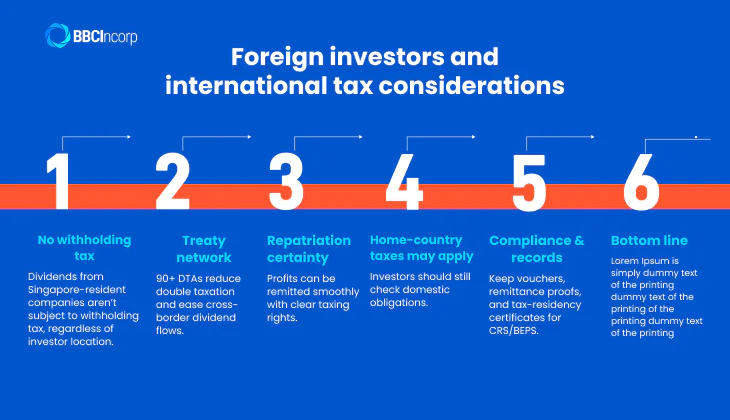
How BBCIncorp helps optimize dividend structures
Singapore’s business environment offers unmatched efficiency and stability for dividend distribution. However, navigating the Singapore dividend tax framework strategically requires more than basic knowledge of tax rules, it demands careful planning, compliance, and international coordination.
With increasing scrutiny from global tax authorities, companies need trusted advisors who can integrate regulatory requirements with practical tax solutions. Through its international tax advisory expertise, BBCIncorp helps businesses design and manage dividend structures that balance compliance, cost efficiency, and cross-border flexibility under the dividend income tax Singapore system.
Tax-efficient corporate structuring for dividends
Designing a tax-efficient corporate structure is fundamental to sustainable dividend planning. Under Singapore’s one-tier corporate tax system, profits are taxed only once at the corporate level before dividends are distributed tax-free to shareholders. To leverage this advantage, BBCIncorp helps clients establish frameworks that facilitate efficient dividend repatriation while maintaining full compliance with IRAS and international tax standards.
For regional and multinational groups, this often involves setting up a Singapore holding company as the central hub to consolidate dividends from subsidiaries across multiple jurisdictions. Our experts evaluate each client’s structure, jurisdictional exposure, and applicable Double Taxation Agreements (DTAs) to determine the most effective routing for dividend flows.
Through tailored international tax advisory, BBCIncorp ensures that foreign-sourced dividends meet the conditions for exemption under Singapore’s foreign income regime. We also review the supporting documentation, such as proof of foreign tax paid, remittance records, and evidence of economic substance, to strengthen compliance and prevent unnecessary audits.
This integrated approach minimizes the risk of double taxation, optimizes cash flow, and improves group-level transparency. By aligning structural design with long-term business goals, BBCIncorp enables companies to operate within a compliant, efficient, and growth-oriented framework under the dividend income tax Singapore regime, consolidating their regional presence through the stability of the Singapore dividend tax system.
BBCIncorp’s support with tax filing and compliance
Tax efficiency depends not only on how profits are structured, but also on how they are reported and maintained. In Singapore, accurate and timely tax filing is essential for compliance with the Inland Revenue Authority of Singapore (IRAS). Both individuals and corporations must declare their income, including foreign-sourced dividends where applicable, through the myTax Portal, in line with national and international reporting obligations.
BBCIncorp provides end-to-end support in this process, managing corporate tax Singapore filings, preparing documentation for foreign income exemptions, and ensuring every submission aligns with IRAS requirements. Our team also assists in identifying eligible reliefs and optimizing the timing of dividend remittances as part of effective tax planning Singapore.
Beyond annual filing, BBCIncorp offers continuous support in regulatory reporting, incorporation compliance, and cross-border tax advisory. By helping clients maintain accurate records and stay ahead of policy updates, we transform compliance from a legal requirement into a strategic advantage, reinforcing transparency, minimizing risks, and sustaining long-term efficiency within Singapore’s trusted tax ecosystem.
Encourage readers to consult with BBCIncorp for customized advice on dividend tax planning and legal compliance.
Conclusion
Singapore remains one of the most favorable jurisdictions for dividend distribution, thanks to its transparent and efficient tax framework. Under the Singapore dividend tax system, most locally distributed dividends are tax-exempt, while foreign-sourced dividends may become taxable depending on their remittance and exemption conditions.
Understanding when and how to declare dividend income is therefore essential for both compliance and financial efficiency. Businesses that plan proactively can minimize risks and ensure that every distribution aligns with IRAS regulations.
Contact us at service@bbcincorp.com to safeguard your business against unnecessary tax exposure and compliance risks.
Frequently Asked Questions
Are dividends from REITs taxable in Singapore?
Dividends distributed by Real Estate Investment Trusts (REITs) generally are tax-exempt for individual investors in Singapore, provided they are not received via a partnership or as part of business/trade income. IRAS’s e-Tax Guide confirms that distributions made by S-REITs to individuals (whether local or foreign) are made without tax deducted at source.
How are dividends from foreign ETFs taxed?
Dividends received from foreign Exchange-Traded Funds (ETFs) are considered foreign-sourced income in Singapore. They are not automatically taxed, but become taxable only when the income is brought (remitted) into Singapore.
However, these dividends may be exempt from tax if they qualify under Section 13(8) of the Income Tax Act 1947. To qualify, all of the following conditions must be met:
- The dividend has already been taxed in the foreign country;
- The headline corporate tax rate of that country is at least 15%; and
- The Comptroller of Income Tax is satisfied that the exemption benefits the Singapore resident recipient.
If these conditions are met, dividends from foreign ETFs are tax-free in Singapore.
Otherwise, they may be taxed at the prevailing corporate or personal income tax rate, depending on the investor’s status.
Can I reinvest dividends without paying tax?
Reinvesting dividends does not remove tax obligations in Singapore. For tax purposes, reinvested dividends are treated as income that has been received by the shareholder, regardless of whether the amount was taken in cash or reinvested.
This means the same tax rules apply: if a dividend is taxable when received, it remains taxable even when reinvested. Reinvestment does not change the income’s nature or tax treatment.
What happens if I don’t declare taxable dividends?
Failing to declare taxable dividends in Singapore can lead to tax under-declaration or incorrect filing penalties under the Income Tax Act.
IRAS treats this as an omission of taxable income, and depending on the severity, may impose:
- Late payment penalties of 5% on unpaid tax, plus an additional 1% for each subsequent month (capped at 12%).
- Additional assessments or back-dated tax recovery, including interest.
- In serious cases, prosecution or fines of up to SG$5,000, and a penalty of up to 200% of the tax underpaid.
If you realize you have omitted dividend income, IRAS encourages taxpayers to make a voluntary disclosure. Doing so can significantly reduce penalties and demonstrate good faith compliance.
What is the tax rate on dividends in Singapore?
Singapore operates a one-tier corporate tax system, where most dividends are tax-exempt for shareholders. Profits are taxed once at the corporate level (17%), and dividends paid by Singapore-resident companies are not taxed again when distributed. There is no withholding tax on dividends to residents or non-residents.
Only foreign-sourced dividends that don’t meet the Section 13(8) exemption may be taxed upon remittance, depending on the recipient’s tax status and treaty benefits.
In most cases, the effective dividend tax rate is 0%, making Singapore one of the world’s most dividend-friendly jurisdictions.
Disclaimer: While BBCIncorp strives to make the information on this website as timely and accurate as possible, the information itself is for reference purposes only. You should not substitute the information provided in this article for competent legal advice. Feel free to contact BBCIncorp’s customer services for advice on your specific cases.
Industry News & Insights
Get helpful tips and info from our newsletter!
Stay in the know and be empowered with our strategic how-tos, resources, and guidelines.





